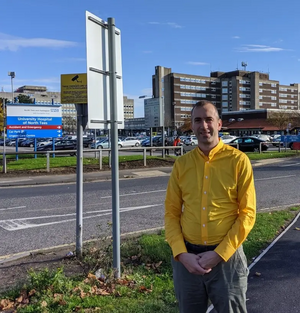Coronavirus is manageable by our NHS if people follow advice to reduce transmission especially thorough handwashing with soap, says doctor

Can COVID 19 be managed by the NHS, one of the best healthcare systems in the world, in which I work in as a junior physician, writes Dr Aidan King?
YES IT CAN
At the end of 2019 a novel coronavirus (COVID 19) was identified as the cause of a cluster of pneumonia cases in Wuhan a major city in the Hubei province of The People's Republic of China. It rapidly spread resulting in an epidemic throughout China. But the visit today by the President of China to Wuhan suggests that the Chinese Government believes its measures have got the epidemic under control.
Understanding of the transmission of COVID 19 is incomplete. Person to person spread is thought to occur mainly via respiratory droplets, resembling the spread of influenza. The incubation period for COVID 19 is thought to be within 14 days of exposure, with most cases occurring approximately 5 days after exposure.
Asymptomatic infections (showing no symptoms) have been described - their frequency is unknown but it is estimated at 50%.
According to the World Health Organisation (WHO) recovery time appears to be around 2 weeks for mild infections and 3-6 weeks for severe disease.
The approach to initial management should focus on early recognition of suspect cases, immediate isolation, and institution of infection control measures. At present, the possibility of COVID 19 should be considered primarily in patients with fever and/or lower respiratory tract symptoms who:
* Reside or have recently travelled (in the last 14days) to areas where community transmission has been reported e.g. China, South Korea, Italy, Iran, Japan or
* Have had recent close contact (in the last 14 days) with a confirmed or suspected COVID 19 patient.
When COVID 19 is suspected, infection control measures should be implemented and public health officials notified. For the NHS telephone helpline dial 111 and online at 111.nhs.uk
Home management may be appropriate for patients with mild infection who can be adequately isolated. Management of such patients should focus on prevention of transmission to others, and monitoring of clinical deterioration, which would prompt admission to hospital.
The WHO advises general measures to reduce transmission of infection, including diligent hand washing, respiratory hygiene (e.g. covering coughs) and avoiding close contact with ill individuals. Research suggests that soap is a great way to treat the virus on the skin, with a recommended 20 seconds before rinsing - there's no need to worry about reported shortages of sanitising gel.
The WHO notes that for people without respiratory symptoms, wearing a medical mask in the community is not required, even if COVID 19 is prevalent in the area. Wearing a mask does not decrease the importance of other general measures to prevent infection, and it may result in unnecessary cost and supply problems.
If our country and all our citizens can follow the guidance on reducing transmission rates the virus is eminently manageable on current provision. The aim of containment is to reduce the peak number of cases and delay this peak. This will allow the NHS the best chance of delivering high quality care to all throughout the next 6 months. Everyone will have their role to play.
